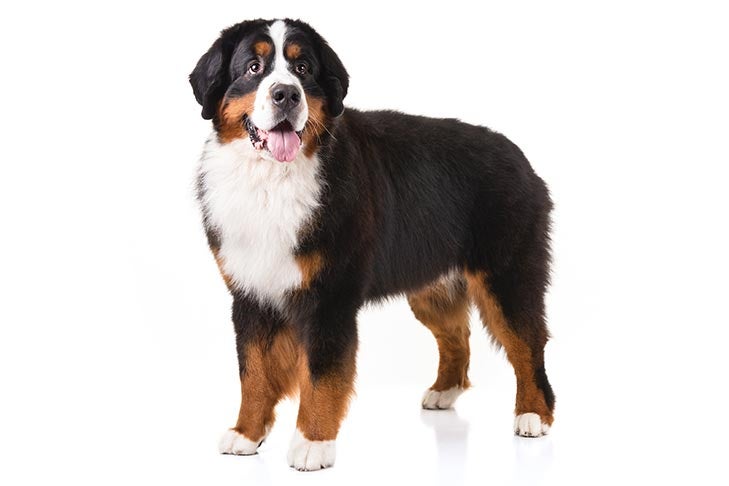The Bernese Mountain Dog is a fascinating mammal that has captured the hearts of many animal lovers. This large breed is known for its striking appearance, gentle nature, and strong loyalty to its owners. In this blog post, we will explore the history, facts, size, habitat, and classification of the Bernese Mountain Dog.
The Bernese Mountain Dog has a rich history that dates back to the Swiss Alps. Originally bred as working dogs, they were used to pull carts, herd livestock, and guard farms. Today, they are beloved family pets known for their calm and patient demeanor.
In terms of size, the Bernese Mountain Dog is considered a large breed. They typically weigh between 80 to 120 pounds and stand at around 25 to 27 inches tall at the shoulder. Their size, combined with their thick fur coat, makes them well-suited to colder climates.
When it comes to habitat, the Bernese Mountain Dog can adapt to different environments, but they excel in rural areas with open spaces where they can roam freely. They enjoy being outdoors and thrive in landscapes that offer opportunities for exercise and exploration.
In the classification of mammals, the Bernese Mountain Dog belongs to the Canidae family, which includes other dog breeds, wolves, and foxes. Within this family, they fall under the Canis lupus familiaris species, which encompasses all domestic dogs.
By delving into the history, facts, size, habitat, and classification of the Bernese Mountain Dog, we can gain a deeper understanding and appreciation for this remarkable animal. Stay tuned for more fascinating content on our blog, where we already have an article covering over 155 different animal species.
History of Bernese Mountain Dog
The Bernese Mountain Dog is a breed that traces its roots back to Switzerland. They were first developed in the canton of Bern, which is in the central part of the country. These dogs were originally used as working dogs on farms and were especially valued for their ability to pull carts and herd livestock. The breed was also known for its strong and sturdy build, which made it well-suited for the demanding tasks of a working dog.
Over time, the Bernese Mountain Dog gained popularity beyond the agricultural sector. They became beloved family pets due to their friendly and gentle nature. The breed’s striking appearance, with its thick coat of fur and distinctive markings, also added to its appeal. Despite the breed’s growing popularity, it faced challenges during the early 20th century, including declining numbers and the threat of extinction. However, dedicated breeders worked hard to preserve and revive the Bernese Mountain Dog population.
Today, the Bernese Mountain Dog is recognized as a breed by kennel clubs and is cherished by dog lovers around the world. They are known for their loyalty, intelligence, and calm temperament. While they may still serve as working dogs in some cases, the majority of Bernese Mountain Dogs are kept as loving companions and are valued for their affectionate and gentle nature. With their unique blend of strength and kindness, Bernese Mountain Dogs continue to make a positive impact on the lives of those fortunate enough to have them as furry family members.
Importance of Bernese Mountain Dog
The Bernese Mountain Dog is a very important animal for several reasons. Firstly, they are known for their gentle and friendly nature, making them excellent companions and therapy dogs. These dogs are patient and love to be around people, which is why they are often used in hospitals and nursing homes to bring comfort and joy to patients.
Secondly, Bernese Mountain Dogs are incredibly strong and capable of performing various tasks. They have a strong work ethic and are often employed as working dogs on farms, helping farmers with tasks such as pulling carts, herding livestock, and even guarding property. Their intelligence and loyalty make them highly reliable and efficient in their work.
Lastly, these dogs also have a beautiful and impressive appearance, with their thick fur and striking markings. They are not only adored for their physical appearance but are also praised for their loyalty and protective nature towards their families. They are known to be good with children and make great family pets. Their presence brings joy and happiness to many households around the world.
Overall, the Bernese Mountain Dog is an important animal due to their friendly nature, strong work ethic, and loyal companionship. They bring comfort to those in need, assist in important tasks, and add warmth and happiness to the lives of many people.
Amazing Facts About Bernese Mountain Dog
1. The Bernese Mountain Dog is a large and sturdy breed of dog that originated in Switzerland.
2. They are known for their distinctive tricolor coat, which is black with white and rust markings on the chest, face, and legs.
3. These dogs have a gentle and friendly nature and are often referred to as “gentle giants.”
4. Bernese Mountain Dogs are great family pets as they are patient, loyal, and get along well with children and other animals.
5. They have a thick double coat which helps them stay warm in cold weather but also requires regular grooming to prevent matting.
6. Despite their size, Bernese Mountain Dogs are not overly active and are generally calm and easygoing companions.
7. Due to their working dog heritage, they have a natural instinct to herd and have been used as farm dogs in the past.
8. These dogs are highly intelligent and trainable, making them suitable for various activities such as obedience training and even therapy work.
9. Bernese Mountain Dogs are prone to certain health issues, including hip and elbow dysplasia, cancers, and bloat, so regular vet check-ups are essential.
10. They have a relatively short lifespan compared to smaller dog breeds, typically around 6 to 8 years.
11. Bernese Mountain Dogs need a moderate amount of exercise, such as daily walks or playtime in a secure area.
12. They may drool, especially after eating or drinking, so it’s important to keep their mouth area clean.
13. Bernese Mountain Dogs are known to be good watchdogs as they are alert and naturally protective of their family.
14. Although they are usually friendly, socialization from an early age is important to ensure they are comfortable around new people and situations.
15. Bernese Mountain Dogs are not well-suited for living in hot climates due to their thick coat, so they are happiest in cooler environments.
Can we keep Bernese Mountain Dog as our Pet?
Keeping a Bernese Mountain Dog as a pet is indeed possible. These dogs are known for being gentle, affectionate, and great with families. However, it’s important to make sure the breed is not extinct before considering them as pets. Unfortunately, if a particular animal species, including the Bernese Mountain Dog, becomes extinct, it means that there are no more of those animals left in the world. This can occur due to various reasons, such as habitat loss, hunting, or diseases.
If the Bernese Mountain Dog were to become extinct, it would be a great loss. These dogs are beloved for their friendly nature, loyalty, and beauty. Their fluffy coats and kind eyes make them a popular choice for many families. However, if they were no longer in existence, it would not be possible to keep them as pets. This is because pets are animals that are alive and can be cared for by humans, and if a species is extinct, it means they are no longer alive.
To prevent animals like the Bernese Mountain Dog from becoming extinct, it is important to support conservation efforts. These efforts include protecting natural habitats, raising awareness about the importance of biodiversity, and implementing laws and regulations to prevent illegal hunting or trading of endangered animals. By taking these actions, we can ensure that future generations will still have the opportunity to keep such wonderful animals as pets.
Size of Bernese Mountain Dog
The Bernese Mountain Dog is a big animal, known for its large size and strong build. They are considered one of the largest dog breeds in the world. Typically, an adult Bernese Mountain Dog stands around 23 to 28 inches tall at the shoulder, which is about the same height as a small child. They can weigh anywhere from 70 to 115 pounds, which is like having a sturdy and heavy piece of furniture in your house!
The Bernese Mountain Dog has a muscular frame with a broad chest and strong legs. Their body is well-proportioned, giving them a balanced appearance. They have a thick double coat with a soft undercoat and a longer, slightly wavy topcoat. This thick coat helps to keep them warm in colder weather. Their paws are big and strong, giving them stability and support as they go about their daily activities.
Because of their large size, Bernese Mountain Dogs need plenty of space to move around and exercise. Although they may look intimidating due to their size, they are actually known to be gentle and friendly animals. They are great companions and are often seen as loving family pets. However, due to their size and strong build, they need proper training and socialization from a young age to ensure they grow into well-behaved and obedient dogs.
To summarize, the Bernese Mountain Dog is a big and strong dog breed. They have a large frame, big paws, and a thick coat that helps them stay warm. Despite their size, they are known to be gentle and friendly pets. So, if you have enough space and love big dogs, a Bernese Mountain Dog may be the perfect furry friend for you!
Habitat of Bernese Mountain Dog
The Bernese Mountain Dog is an animal that is well-adapted to living in a specific type of environment. This breed of dog thrives in the mountains and hilly regions. It can be found in the Swiss Alps, where the weather is cool and the landscape is rugged. These dogs enjoy the crisp mountain air and are very comfortable in the snowy conditions that are common in this area.
The habitat of the Bernese Mountain Dog is characterized by its natural surroundings. It prefers to live in places with plenty of open space, such as meadows and fields. These dogs need room to roam and explore, as they are known for their adventurous nature. The mountains are an ideal environment for them, as they can run and play freely in the vast open spaces.
In addition to the physical aspects of their habitat, Bernese Mountain Dogs also thrive in a social environment. They are a very friendly breed and enjoy being around people and other animals. These dogs are often kept as pets, and they make great companions for families. They are known for their loyalty and affectionate nature, which is why they are often referred to as “gentle giants.”
In conclusion, the Bernese Mountain Dog is a breed that is perfectly suited to living in the mountains. They enjoy the cool weather and are comfortable in snowy conditions. Their habitat consists of open spaces such as meadows and fields, where they can run and play. They are also very social animals and thrive in the company of people and other animals.
Evolution of Bernese Mountain Dog
The evolution of the Bernese Mountain Dog can be traced back thousands of years. It is believed that their ancestors were large working dogs, bred by farmers in the Swiss Alps to help with various tasks. These dogs were strong, agile, and had a thick coat to protect them from the harsh mountain climate. Over time, these traits were passed down through generations, resulting in the development of the Bernese Mountain Dog as we know it today.
In the early days, these dogs were mainly used for herding livestock and pulling carts in the mountainous regions of Switzerland. Their strength and endurance made them excellent working dogs, as they could traverse steep terrain and harsh weather conditions with ease. The Bernese Mountain Dog’s thick and beautiful coat was also an adaptation to the cold climate, providing them with insulation and protection from the elements.
As time went on, the Bernese Mountain Dog gained popularity beyond its working origins. Their gentle nature, loyalty, and affectionate temperament made them wonderful family pets and companions. This led to more intentional breeding efforts focusing on their temperament and appearance, resulting in the modern Bernese Mountain Dog breed we see today.
In conclusion, the Bernese Mountain Dog has evolved from its working roots in the Swiss Alps to become a beloved companion and family pet. It has retained its strength, agility, and weather-resistant coat, while also developing a gentle and friendly temperament. This evolution is a testament to the adaptability and versatility of this wonderful breed.
Classification of Bernese Mountain Dog
The Bernese Mountain Dog is a large and gentle breed of dog that belongs to the working group. They are known for their strength, intelligence, and loyalty. These dogs originated in Switzerland and were used for various tasks such as herding, guarding, and pulling carts.
The Bernese Mountain Dog has a sturdy and powerful build with a thick double coat that helps protect them from the cold weather. They have a black coat with distinctive rust-colored markings on their face, chest, and legs. This breed is characterized by its friendly and calm temperament, making them excellent family pets and therapy dogs.
In terms of size, male Bernese Mountain Dogs typically weigh between 80-120 pounds and stand around 24-28 inches tall at the shoulder, while females are slightly smaller, weighing between 70-100 pounds and standing around 23-27 inches tall. Their lifespan is generally around 6-8 years.
In summary, Bernese Mountain Dogs are a large and intelligent breed that is best known for their strength and loyalty. They are part of the working group and have a strong build with a thick coat. These dogs are friendly and calm, making them great companions for families. However, it’s important to note that their lifespan is relatively shorter compared to other breeds.
Different Types of Bernese Mountain Dog
1. Loyal companion: Bernese Mountain Dogs are known for their unwavering loyalty to their owners. They will always be by your side, providing love and support no matter what.
2. Gentle temperament: These dogs have a calm and gentle nature, making them great family pets. They are patient and tolerant, especially with children, making them ideal for households with young ones.
3. Protective instincts: Bernese Mountain Dogs have a strong protective instinct towards their family members. They will alert you to any potential danger, making them excellent guard dogs.
4. Playful and fun-loving: Despite their large and sturdy appearance, Bernese Mountain Dogs love to play and have fun. They enjoy various activities such as fetching balls, running around, and engaging in interactive play with their owners.
5. Good with other pets: Bernese Mountain Dogs can get along well with other pets, including cats and other dogs. With proper socialization, they can form lasting bonds and create harmonious relationships.
6. Intelligent and trainable: These dogs are intelligent and can be easily trained if given consistent and positive reinforcement. They thrive in an environment where they are mentally stimulated and given tasks to perform.
7. Excellent hiking and outdoor companions: Due to their origins as Swiss farm dogs, Bernese Mountain Dogs have a natural inclination towards outdoor activities. They are well-suited for hiking, walking, and engaging in various outdoor adventures with their owners.
8. Adaptable to different environments: Despite their thick double coat, Bernese Mountain Dogs can adapt to various climates and environments. They can tolerate both cold and warm weather, making them suitable for different regions.
9. Affectionate and loving: Along with their loyalty, these dogs are incredibly affectionate towards their owners. They enjoy being cuddled, hugged, and receiving lots of attention, making them perfect for individuals seeking a loving and devoted companion.
10. Beautiful and majestic appearance: Bernese Mountain Dogs are renowned for their stunning appearance. With their tri-colored coat, bold markings, and a powerful build, they have an undeniable elegance that captivates all who see them.
Geographical Presence of Bernese Mountain Dog
The Bernese Mountain Dog is a lovely animal that can be found in the region of the Swiss Alps. Yes, you heard it right! These big, furry dogs come from Switzerland! Nestled high up in the mountains, the Bernese Mountain Dog is a favorite among locals. Its thick coat and sturdy build allow it to withstand the harsh weather conditions in this region.
Unfortunately, you won’t be able to spot a Bernese Mountain Dog in just any part of the world. These adorable creatures are not commonly found outside of the Swiss Alps. While they may have gained popularity in other countries as pets, their origins and true home remain in Switzerland. So if you’re seeking a genuine Bernese Mountain Dog, you’ll need to make your way to the stunning Swiss Alps.
Although the Bernese Mountain Dog can only be found in the Swiss Alps, its popularity has spread far and wide. Many people from around the world have fallen in love with these gentle giants. Despite not being native to their countries, Bernese Mountain Dogs can now be seen in various parts of the world as beloved family pets. Their calm and friendly nature make them a fantastic addition to any household looking for a loyal companion.
In summary, the Bernese Mountain Dog is a beautiful animal that originates from the region of the Swiss Alps. While they can be spotted in other parts of the world, their true home and natural habitat are in Switzerland. These dogs have captured the hearts of many people globally and are cherished as family pets in various countries.
Scientific Name of Bernese Mountain Dog
The scientific name of the Bernese Mountain Dog is Canis lupus familiaris. The first part of the name, Canis, refers to the genus of domestic dogs, which includes all breeds of dogs. The second part, lupus, means wolf, emphasizing the close genetic relationship between dogs and wolves. The third part, familiaris, distinguishes domestic dogs from wild wolves.
The Bernese Mountain Dog, also known as Berner Sennenhund, is a large working dog breed. They are known for their sturdy build, intelligence, and gentle nature. These dogs were originally bred in the Swiss Alps to assist farmers with various tasks, such as pulling carts, herding livestock, and guarding the homestead.
The scientific name provided for the Bernese Mountain Dog, Canis lupus familiaris, is the same for all domestic dogs. However, the Bernese Mountain Dog has its own unique characteristics and traits that set it apart from other breeds. Its history as a working dog, its distinctive appearance with a thick, tricolored coat, and its friendly temperament all contribute to its popularity as a loyal family pet and companion.
Diet of Bernese Mountain Dog
The diet of a Bernese Mountain Dog is essential for their overall health and well-being. These gentle giants require a balanced and nutritious diet to keep them strong and active. Their diet should consist of high-quality dog food that is specially formulated for large breed dogs. It is important to provide them with the right amount of food according to their age, size, and activity level.
The diet of a Bernese Mountain Dog should include a proper ratio of proteins, carbohydrates, and fats. Proteins are crucial for building and repairing muscles, so it is important to choose a dog food that contains meat as the main ingredient. Carbohydrates provide energy and should come from sources like whole grains and vegetables. Healthy fats, such as omega-3 fatty acids, are important for their skin and coat health.
It is also important to monitor their portion sizes and avoid overfeeding. Bernese Mountain Dogs are prone to obesity, which can put extra stress on their joints and lead to other health problems. Regular exercise is also important to keep them fit and maintain a healthy weight.
In conclusion, the diet of a Bernese Mountain Dog should consist of high-quality dog food that is specially formulated for large breed dogs. It should include a balance of proteins, carbohydrates, and fats. Portion control and regular exercise are also important to keep them healthy and prevent obesity. By providing a nutritious and well-balanced diet, Bernese Mountain Dogs can live a long and happy life.
Locomotion of Bernese Mountain Dog
The Bernese Mountain Dog is a strong and sturdy animal, and its locomotion, or the way it moves, is quite fascinating. When it walks or runs, all four of its legs move together in a balanced motion. This helps the dog maintain stability and ensures that it doesn’t trip or fall easily. The muscles in its legs work together to propel it forward, enabling it to move quickly and smoothly.
When the Bernese Mountain Dog walks, its legs move in a straight line, one after the other. This gives it a graceful and coordinated stride. When it starts running, all four legs leave the ground for a brief moment, allowing the dog to move faster. It uses its tail as a counterbalance, swaying it from side to side to help with stability. Its large and powerful paws provide a solid grip on the ground, allowing it to navigate various terrains with ease.
In summary, the Bernese Mountain Dog has a unique way of moving. With all four legs working together and its tail swaying for balance, it can walk and run gracefully. This enables the dog to explore its surroundings and move swiftly to keep up with its energetic lifestyle.
Social and Sexual Behaviour of Bernese Mountain Dog
Bernese Mountain Dogs are social animals, which means they like to be around other dogs and people. They enjoy spending time with their family and are very friendly. These dogs are known for being gentle and patient, especially with children. They are often referred to as “gentle giants” because of their calm and laid-back nature. They are also known for being good with other pets, such as cats.
When it comes to sexual behavior, Bernese Mountain Dogs, like many other dogs, have a mating instinct. This means that when they reach a certain age, they may start showing signs of being interested in mating. Male dogs may become more protective and may try to attract female dogs. Female dogs may show physical signs such as a swollen vulva when they are in heat, which means they are ready to mate.
However, it is important to note that responsible pet owners often choose to spay or neuter their Bernese Mountain Dogs. This procedure helps control the population of dogs and can also prevent certain health problems. Spaying or neutering a dog also helps reduce unwanted behaviors, such as roaming and aggression.
Reproduction and Lifecycle of Bernese Mountain Dog
The reproduction process and life cycle of the Bernese Mountain Dog animal is fascinating! These wonderful dogs start their life as tiny puppies. A female Bernese Mountain Dog becomes ready to have puppies when she is about two years old. When she is in heat or ready to mate, the male dog will try to court her. If the female is interested, they will mate, and she will become pregnant. After about two months, the female will give birth to a litter of adorable puppies. The mother dog takes great care of her puppies, feeding and cleaning them until they are ready to explore the world on their own.
Once the puppies are around one or two months old, they start to grow quickly. They learn to walk and play, becoming more independent as time goes on. As they grow, they explore their surroundings, learn from their mother, and develop their unique personalities. It is a joy to watch them grow and learn new things every day.
As the Bernese Mountain Dogs reach six to eight months old, they enter adolescence. This is a time when they may test their boundaries and become a bit more challenging to train. However, with love, patience, and proper guidance, they become well-behaved and loyal companions. The Bernese Mountain Dog’s life cycle continues as they reach adulthood around two years old. They are now fully grown and ready to live their lives as strong, healthy, and happy dogs, bringing joy to their families for many years to come!
Threats to Bernese Mountain Dog
There are several threats that pose a danger to Bernese Mountain Dogs. One of the main threats is heat. These dogs have thick coats that can make them very uncomfortable in hot weather. They can suffer from heat stroke or become dehydrated quickly. It is important to keep them in a cool environment and offer plenty of water to prevent these risks.
Another threat to these lovely animals is hip dysplasia. This is a genetic condition that affects their hip joints. It can cause pain and difficulty in walking. Unfortunately, Bernese Mountain Dogs are prone to this condition, so it is crucial to provide them with proper exercise, a balanced diet, and regular veterinary check-ups to identify and manage this problem.
Lastly, another danger for Bernese Mountain Dogs is the lack of exercise. These dogs are active and strong, and they require daily exercise to keep them happy and healthy. Without enough exercise, they can become bored and develop behavioral issues. They may also gain weight, which can lead to other health problems. Regular walks, playtime, and activities are essential to prevent these risks and provide a stimulating environment for them.
In summary, Bernese Mountain Dogs face threats such as heat, hip dysplasia, and lack of exercise. It is vital to protect them from extreme heat, manage potential hip joint problems, and ensure they receive enough physical activity. By taking these precautions, we can help keep these wonderful dogs safe and thriving.
Population of Bernese Mountain Dog
The population of Bernese Mountain Dogs is estimated to be around 70,000 worldwide. These gentle and friendly dogs are known for their sturdy build and beautiful tricolor coats. They are often kept as family pets, as they are great with children and other animals. Bernese Mountain Dogs originated in Switzerland and are popular both in their home country and worldwide.
Unfortunately, if the Bernese Mountain Dog were to become extinct, it would mean that there are no more of these special animals left in the world. Extinction can happen due to various reasons, including habitat loss, climate change, and diseases. It is important to protect and conserve the natural habitats of animals to prevent such a tragic event from occurring.
Bernese Mountain Dogs are a beloved breed, and their population is currently stable. However, it is crucial to raise awareness about responsible breeding and ensure their well-being. By taking these measures, we can help maintain a healthy population of Bernese Mountain Dogs and continue to enjoy their companionship for many years to come.
Conclusion
In conclusion, the Bernese Mountain Dog is an amazing animal that has a rich history and fascinating facts. This gentle giant is known for its large size and beautiful black, brown, and white coat. They are a breed of working dogs that originated in Switzerland and were primarily used for herding cattle and pulling carts.
With their friendly and calm nature, Bernese Mountain Dogs make great family pets and are often referred to as gentle giants. Despite their size, they are very affectionate and love to be around people. They are also known for their loyalty and protective instincts, making them excellent watchdogs.
The Bernese Mountain Dog is a large breed, with males weighing between 80 to 115 pounds and females weighing between 70 to 95 pounds. They have a sturdy build and are well-suited for their original purpose of working on farms and in the mountains.
In conclusion, the Bernese Mountain Dog is a wonderful animal. They have a rich history, impressive size, and friendly nature. If you’re looking for a loyal and loving companion, the Bernese Mountain Dog may be the perfect choice for you.
Frequently Asked Questions about Bernese Mountain Dog (FAQ’s)
Q: What is a Bernese Mountain Dog?
A: A Bernese Mountain Dog is a large breed of working dog that originated in Switzerland.
Q: How big do Bernese Mountain Dogs get?
A: Bernese Mountain Dogs are typically large, with males weighing between 80-120 pounds and females weighing between 70-110 pounds.
Q: Are Bernese Mountain Dogs good family pets?
A: Yes, Bernese Mountain Dogs are known for their gentle and affectionate nature, making them excellent family pets.
Q: Do Bernese Mountain Dogs require a lot of exercise?
A: Yes, Bernese Mountain Dogs are an active breed and require regular exercise, including daily walks and playtime.
Q: Do Bernese Mountain Dogs shed a lot?
A: Yes, Bernese Mountain Dogs have a thick double coat that sheds heavily, particularly during the spring and fall.
Q: How long do Bernese Mountain Dogs live?
A: On average, Bernese Mountain Dogs have a lifespan of around 6-8 years.
Q: Are Bernese Mountain Dogs prone to any health issues?
A: Yes, Bernese Mountain Dogs can be prone to certain health issues such as hip dysplasia, cancer, and bloat.
Q: Do Bernese Mountain Dogs require grooming?
A: Yes, Bernese Mountain Dogs require regular grooming to keep their coat clean and tangle-free.
Q: Are Bernese Mountain Dogs easy to train?
A: Bernese Mountain Dogs are intelligent but can be stubborn, so they may require consistent, patient training methods.
Q: Are Bernese Mountain Dogs good with children?
A: Yes, Bernese Mountain Dogs are generally good with children and are often described as gentle and tolerant.
Q: Can Bernese Mountain Dogs live in apartments or small homes?
A: While Bernese Mountain Dogs are adaptable, their large size and energetic nature make them better suited for homes with a yard or open space.
Q: Do Bernese Mountain Dogs get along with other pets?
A: Bernese Mountain Dogs typically get along well with other animals if properly socialized from a young age.
Q: Are Bernese Mountain Dogs good guard dogs?
A: Bernese Mountain Dogs have a friendly nature and may not be naturally inclined to be guard dogs, but their size and protective instincts can make them effective deterrents.
Q: Do Bernese Mountain Dogs require a specific diet?
A: Bernese Mountain Dogs thrive on a balanced diet of high-quality dog food, with consideration for their size, age, and activity level.
Q: Are Bernese Mountain Dogs good for first-time dog owners?
A: While they are generally friendly and loving, the Bernese Mountain Dog may not be the best choice for a first-time dog owner due to their large size and individual needs.

Hey there, I’m Tyler Swan! I worked as an Animal Care Specialist at Neuralink and completed my education at the University of California, Davis. Animals have always fascinated me, so I chose to study and work with them.
In my job, I take care of animals and make sure they’re healthy and happy. I’ve had cool roles like Lab Manager and Senior Research Assistant at Mitloehner Lab, where I’ve learned much about animals.
I’m not just about work, though. I love animals so much that I write articles about them! I enjoy sharing fun and interesting facts about our furry and feathered friends.
If you ever want to know more about animals or need help with animal info, ask! I’m here to make learning about animals easy and fun, just like chatting with friends.












